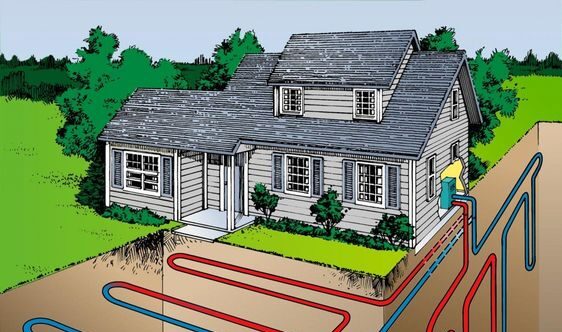The Benefits of Switching to a Geothermal Heat Pump
With the high cost of energy, the value of energy efficiency is becoming more and more important. Geothermal heat pumps (GHP), while a less common type of heating system, are a good way of saving energy and money. GHP are used as a method of both heating and cooling that uses the stable ground temperature to heat in the winter and cool in the summer. This is different and more efficient than an air source heat pump (ASHP) because GHP pull energy from the ground, which is far more consistent than outside air.
Geothermal heat pumps utilize long, liquid-filled piping well below the frost line of the Earth which stays at a relatively consistent ground temperature range of 55-65 degrees through the seasons in the Asheville area. This means less electricity is needed to get the right temperature inside the house. There are four types of GHP to fit a variety of situations in our region – closed loop horizontal and vertical, open loop, and standing water column. Most houses in WNC will use either horizontal or vertical closed loop.
Horizontal tubing is buried at about 6 ft deep and requires about the same amount of ground space as your heated square footage, while vertical tubing can go up to 600 ft deep and can fit on virtually any lot. GHP can also eliminate burning any fossil fuels in your house!
Energy and Cost Savings of Using a Geothermal Heat Pump
Despite the cost of a geothermal installation being significantly more than an ASHP system of a comparable capacity, the current tax credit of 30% makes the price significantly more obtainable, especially when factoring in the long life span of 25-30 years for the equipment and formally “over 100 years” for the ground loop, making it permanent infrastructure and increasing the value of your home. In general, the cost saved on energy bills with GHP is 40% to 70% greater than that of a typical heating system depending on type. While costs may vary based on multiple factors such as the size of a house and type of GHP ground loop, the average installation cost of approximately $24,000 would entail you $7,200 worth of tax credits and they can generally be financed at no net added cost overall. Geothermal will provide about 95°F-120°F in heating, compared to a traditional boiler which can provide 160°F-175°F but at more energy loss and with fossil fuel energy use and carbon emissions.
Restrictions and Qualifications
There are a few restrictions or qualifications needed for the cost reductions provided by the installation of a GHP. In order to qualify for the IRS Sec. 25D Residential Clean Energy credit for a geothermal heat pump, the installed GHP must be “any equipment which— (i) uses the ground or ground water as a thermal energy source to heat the dwelling unit referred to in subparagraph (A) or as a thermal energy sink to cool such dwelling unit, and (ii) meets the requirements of the Energy Star program”. However, the uncapped 30% tax credit applies to the combined total of all of the GHP equipment, installation costs of the ground loop, and any electrical upgrades which may be needed, making the effort more than worth it!
How do I get my Geothermal Heat Pump tax credit?
For you to get access to tax credits provided in IRS Sec. 25D Residential clean energy credit, fill out IRS form 5695 (instructional guide to completing Form 5695 available through the IRS website). These are the same IRS tax credit forms used for solar electricity property, solar water heating property, small wind energy property, or Biomass fuel property!
Thank you to Rick Clemenzi and Judy Siglin of Geothermal Design Center for consulting on this blog. Learn more about the engineering firm that specializes in GHP here.
Sources:
https://www.energy.gov/energysaver/geothermal-heat-pumps
https://www.taxnotes.com/research/federal/usc26/25D
https://www.rewiringamerica.org/app/ira-calculator/information/geothermal-heating-installation
https://www.irs.gov/pub/irs-pdf/i5695.pdf, https://www.irs.gov/pub/irs-pdf/f5695.pdf


